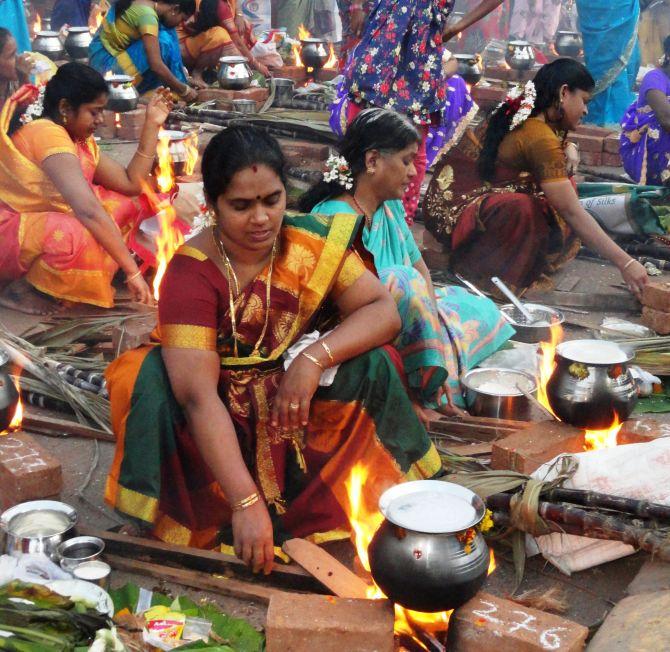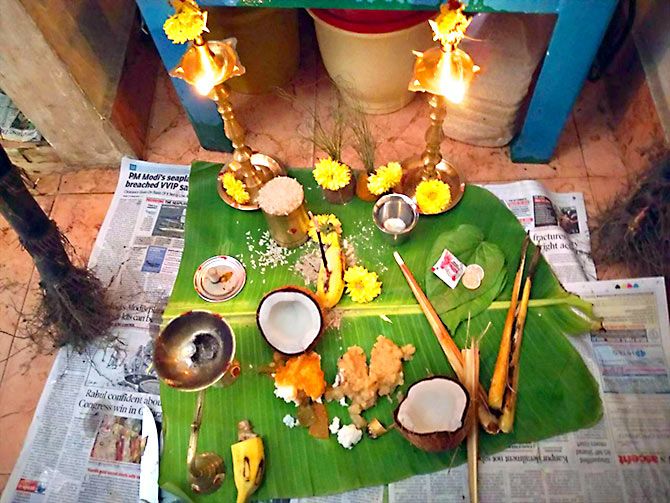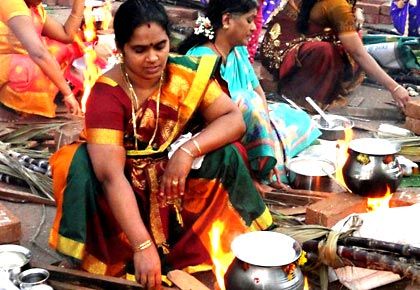 | « Back to article | Print this article |
Indians who live away from home tells us how they are celebrating the winter harvest festival.

In Sedapatti, a village in Tamil Nadu's Madurai district, Annalakshmi Muthuswamy, 52 rushes home with a bag of vegetables and groceries.
Her husband, a retired school teacher tails behind with two stalks of sugarcane and some plantain leaves.
The couple is excited to celebrate Pongal with their daughter Seetha after three years.
Like most youngsters in India, Seetha, 21 is pursuing engineering in Bengaluru, and has been bringing in the New Year away from her parents and friends.
"She'll reach home late, but at least she agreed to come a day before the festival," Annalakshmi tells Divya Nair/Rediff.com over the phone, while talking about their elaborate plans for Pongal which falls on January 15 this year.
"It is so boring to celebrate without kids. We make video calls and update each other, but it is not the same," the father adds.
Their son Senthil, 33 who lives and works in Mumbai with his wife and a son has taken one day’s leave from work this year to celebrate the festival with his parents.
"We came here on Friday night and will fly back on Tuesday. In Mumbai, Monday is a holiday for (Makar) Sankranti. My wife and I have to resume work on Wednesday and our son has to go to school," Senthil informs.
While Seetha and Senthil made it for Pongal this year, Latha Ramakrishnan, 30 who moved to Kuala Lumpur, Malaysia four years ago hasn't been home for Pongal since.
Latha whose family is originally from Thirunelveli is missing the celebrations back home in Chennai where she grew up.
"For us, Pongal is bigger and more important than Diwali, but I can't apply for leave in January," Latha says.
"We are three sisters. When we were kids, we'd wake up early in the morning, before sunrise, bathe, wear new clothes and matching accessories," the engineer reminisces.
"We'd start our day praying to sun god. Then Amma would cook rice and dal in two different pots. Pongal means boiling over so we wait for the rice to boil over. In one pot, we'd add salt and cashews to make kaara pongal (spicy pongal). In the other one, we add jaggery and cardamom to make chakkara pongal (sweet pongal)."

Latha fondly boasts about the sambaar her mother would make.
"There is some deal about the number of vegetables that goes into the sambaar. Amma would insist on counting and using only odd number of vegetables. Excluding onion and tomatoes, the number would go up to 25 also," she describes.
"I miss my Amma's sambar on Pongal," she says.
The pongal, sambar, rice and sugarcane is served and offered to God before it is served to the family.
While millennials and young Indians who have moved away from their hometowns miss the traditional celebrations, they have found temporary solace in Indian friends and built a community abroad.
Vinayak Mudaliar, 34 who grew up in Tirunelveli and moved to California in the United States in 2010 celebrates Pongal with his Indian friends who he calls his new family.
"We celebrate Pongal, Lohri and Makar Sankranti together. Since we don't get a holiday, we decide on the nearest Sunday and come together. It's like a potluck. Everyone gets their traditional food and sweets and we sit together and enjoy."
"The first time I made Pongal after watching a YouTube video it turned out disastrous. I think I added more salt and less water. The pan almost got burnt but I didn’t tell my mother," says Anand Nataraj, 28 who lives in Mumbai and plans to wear a new kurta to work on Tuesday.
Latha complains she doesn't have the time to cook an elaborate meal like her mother, but she hopes at least she can cook chakkara pongal and share it with her Indian colleagues on January 15.
Meanwhile Latha's mother will call up her 'forgetful' sister and remind her specifically not to have any non-vegetarian food on Tuesday.
Despite the 12-hour time difference, Vinayak says that every year during Pongal, he makes a video call to join his parents and see the pot boiling over.
"It brings good luck and symbolises prosperity. It is one ritual I haven't missed in years," he says.

Dear readers, how are you celebrating the festival?
Click here to share your Sankranti, Pongal, Lohri, Bihu memories on Rediff.com!